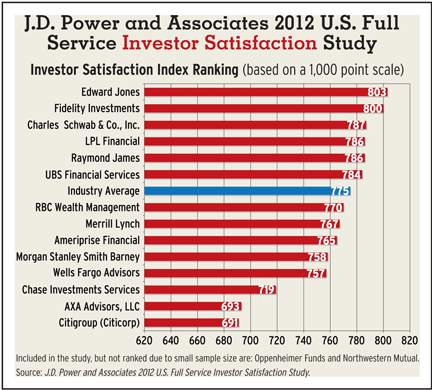Investors are not happier campers when it comes to their full service brokerage, according to the latest satisfaction study by J.D. Power and Associates. Overall investor satisfaction is statistically flat—not only when compared with last year, but with crisis-laden 2008 as well, says David Lo, Power’s director of investment services.
Advisors, take note: How you manage your relationship with your clients is still of primary importance. The top scoring brokerage this year, Edward Jones, scored highest on the subcategory of the clients’ satisfaction with advisors.
What may concern advisors across the industry is that satisfaction is flat despite Power’s finding that advisors actually are spending more face time with their clients. Lo says that the frequency of “proactive outreach” is up slightly in the areas involving investor portfolios and investment performance.
For example, the number of contacts between advisors and clients regarding portfolio/asset allocation issues rose to 3.2 per year, up from 2.3 in 2008, Power reports.
“It takes more touch to achieve a similar satisfaction level than in the past,” Lo says. He thinks social media is raising investor expectations; their use has risen significantly in the past five years.
“What people are talking about is what they’re getting from their brokers, validating their financial plans, and they’re seeing and comparing what they can get from somewhere else,” Lo says. “ Because people have more information, the expectations are greater.”
The survey, Power’s 2012 U.S. Full Service Investor Satisfaction Study, is in its tenth year. About 4,400 investors with non-retirement brokerage accounts were surveyed by Power online in February. The median investable assets were $243,000.
Scoring high marks for the second year in a row are two firms seen as the bane of most retail brokerages: discounters Fidelity Investments and Charles Schwab. Fidelity ranked second while Schwab placed third.
Lo said the majority of the two firms’ business is discount trading, but the firms still have an advisory product offering that investors in the survey cited when asked about who they did their investing with. But Fidelity and Schwab only received average ratings from investors on their satisfaction with the advisors; the discounters got higher marks for account offerings and investment performance.
Three of the four wirehouses—Merrill Lynch, Morgan Stanley Smith Barney, and Wells Fargo Advisors—scored below the industry average, while UBS Financial Services scored above. It was the second year in a row that UBS was above the average while the others fell below it.
Ed Jones has enjoyed high rankings on the Power investment satisfaction survey in the past; it last ranked in first place in 2010. It also consistently places high up on satisfaction surveys among its own advisors; Power gave it the top rating in its Employee Financial Advisor Satisfaction survey earlier this year.
It has 11,650 advisors in the United States, Managing Partner Jim Weddle says. He says the rankings are not an accident.
The privately-held firm has upgraded its technology for advisors that allows them to work more efficiently with clients when they’re in the office; it introduced a new client relationship management program, Relationship Manager, 18 months ago, and upgraded its Financial Assessment Solution Tools (FAST) program a few months ago. FAST helps advisors manage particular financial issues for clients, such as planning for retirement.
Ed Jones also surveys clients at mature branch offices and shares the findings with advisors each quarter. The Client Experience Index, as the survey is called, was launched four years ago. A year ago the firm started asking more focused questions to provide better feedback, Weddle says.
The lack of stronger satisfaction in the Power survey is to be expected given the difficult times they’ve experienced in recent years, Weddle says.
“People have come to want, need and even expect a more robust discussion of risk, of the cost of doing business with any financial services firm, ours included. They want a plan and they want an update,” he says. “I’m not surprised to hear that brokers feel like they’re having to work a lot harder…It’s been three yards and a cloud of dust the last few years.”





